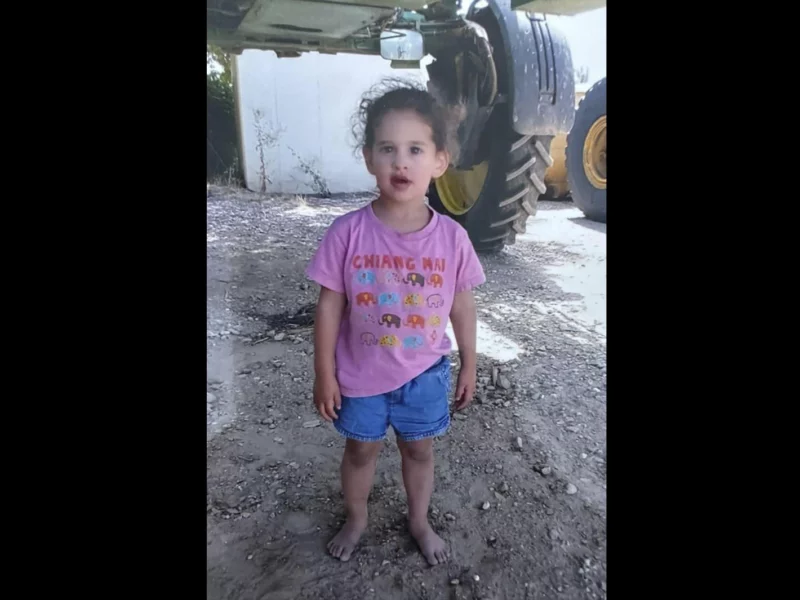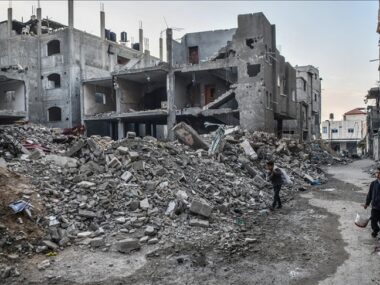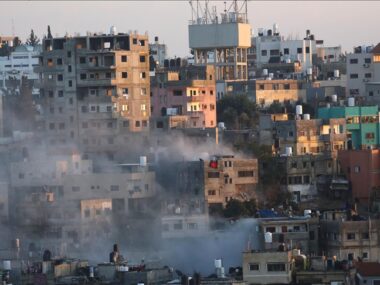Even though Abigail Edan was only three years old when her parents were assassinated by Hamas militants on October 7, she was aware enough to flee to a neighbor’s house for safety.
As the rampage continued, Abigail was taken in by the Brodutch family, consisting of mother Hagar and her three children. Then all five vanished, and both families said that the government subsequently confirmed that they were Hamas captives. On Israel’s worst day, over 200 people had been hauled to Gaza, according to the families.
Even while close-knit Israel laments the deaths of over 1,400 people at the hands of militants, the families of the captives have been thrust by the waking nightmare into a shroud of uncertainty that is different from grief. The relatives of an estimated thirty children who have been kidnapped from Israel speak of an even more agonizing pain: the awareness that their loved ones are defenseless while in captivity.
In a phone chat, Abigail’s aunt Tal Edan remarked, “She’s a baby, just 3 years old, and she’s all alone.” Her voice wavered. I’m not sure if she’s still with her neighbor, but maybe she was. She is alone.A devastating undercurrent among the tragedies has been the disproportionate toll that the Hamas killing and the increasing Israeli shelling of the small enclave have inflicted on children in both Israel and Gaza.
Of Gaza’s 2.3 million inhabitants, children make up nearly half. The number of Palestinian deaths has risen to 7,000, with 2,913 children among them, according to a report released on Thursday by the Health Ministry, which is run by Hamas. In Gaza, almost 800 youngsters are still unaccounted for.
By the Geneva Conventions, holding civilians as hostages is considered a war crime.
However, Danielle Gilbert, an assistant professor of political science at Northwestern University who has conducted hundreds of interviews with captors and hostages across several nations, noted that kidnapping children during a war is a virtually never-ending process. The logic is severe: Male hostages between the ages of 18 and 65 are usually valuable to abductors. Children have a worse chance of surviving the experience.
“The kidnappers’ job will be made more difficult if they are holding onto someone who is vulnerable and not suited to survive in those conditions,” Gilbert stated. “Whether Hamas intended to take this many hostages is still up in the air.”
The families of the kidnapped Israeli youngsters describe a variety of emotions, from optimism to sadness to wrath, with sleep difficult and a welcome diversion from worst-case scenarios. In a desperate attempt to get information, confirmation of life, and the return of their loved ones, many are using this opportunity to talk with the media.
The usual seven-day Jewish mourning period began on October 20, when Roy and Smadar Edan were buried. However, there isn’t a set ceremony for kids who are kidnapped during a conflict. Thus, the Edans made every effort to ensure Abigail’s presence.
Tal, who is wed to Roy’s brother Amit, remarked, “She comes into my dreams.” “She interrupts every discussion we have here. Everyone is inquiring about her, wanting to know how her night went and whether or not she is being held. since she is alone herself.
Ella Elyakim, 8, and Dafna Elyakim, 15, have been gone for an endless amount of time, and Maayan Zin is doing everything she can to spread the news about them. On October 7, they were paying a visit to their father, Noam Elyakim, who lived with his partner, Dikla Arava, and her 17-year-old son, Tomer, at Nahal Oz, a kibbutz close to the Gaza border.
Later, she watched a video that seemed to show all five of them sitting under pressure while militants made demands, Dafna sobbing and Noam bleeding from his leg. Then she noticed pictures of the girls in pajamas that weren’t their own, sitting on mattresses. Ella’s hand has two wrapped fingers.
Local media reported that the bodies of Noam, Dikla, and Tomer were later discovered close to the Gaza border.
Maayan now expresses concern in interviews that the girls witnessed their father’s murder. She makes an effort to ignore the fact that someone dressed her girls differently. How is Dafna, who is old enough to comprehend what’s going on, and what happened to Ella’s hand, she wonders?
Hearing that four hostages had been freed made Maayan pleased, and she prayed that her girls would be next. She hasn’t been getting enough sleep.
Maayan Zin stated in a Zoom interview, “I’m thinking that I hope that they won’t return them to me in a coffin.” “It’s an emotional rollercoaster.”
Some families are growing impatient after being cautious for the first two weeks to avoid publicly criticizing the government.
“Our government has failed us twice: once on October 7 and again now that our children are still detained,” said Hadas Kalderon, whose son Erez celebrated turning 12 on Thursday while being held captive.
One recent night at three in the morning, Avichai Brodutch, the distraught husband of 40-year-old Hagar and father to 10-year-old Ofri, 8-year-old Yuval, and 4-year-old Uriah, who vanished with Abigail, set up a chair across the street from Israeli army headquarters and hung up a sign. It said, “My family is in Gaza.”
Erez’s mother, Hadas Kalderon, claims she hasn’t had time to mourn her own mother, Carmela, 80, and her 12-year-old niece, Noya, who were slain in Nir Oz. She is too preoccupied with advocating for the release of her family members Erez, Sahar, 16, and the children’s father, Ofer, 53.
There is a video out there that shows them in captivity, she informed reporters on Thursday. She initially objected to seeing it.
“And then, knowing that he’s still alive makes me extremely happy,” she exclaimed. “After that, I’m glad they were abducted since the alternative was for them to be killed. My life must be saved in order to rescue theirs.
She claims that she experiences emotions in a sliding scale. She remembered that Erez had always feared being alone himself, that he would experience loneliness.
About the youngster she describes as “full of love,” Hadas remarked, “Now it’s like his worst nightmare come true.”
She continued, “I can hear him all the time.” “I hear him yelling, ‘Mom, Mom, save me,’ and sobbing.”











